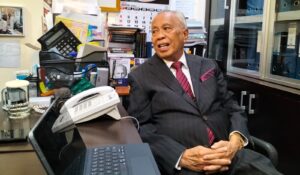
Jakarta, posinternasional.com
The lawyer for Fernando Miguel Gama De Sousa, a Portuguese citizen who was caught with drugs, was sentenced to death, Prof. OC Kaligis stated that prosecutors are not tools to satisfy the prestige of their positions by demanding indiscriminately.
“Prosecutors are asked to continue to respect and appreciate Human Rights (HAM) so that there needs to be mature consideration and not arbitrarily,” said OC Kaligis in Jakarta, Monday.
The problem is related to prosecutor Raden Isjunianto demanding the death penalty for Kaligis’ client, namely Fernando Miguel Gama De Sousa, even though various evidence of drugs in the form of liquid cocaine was not under the defendant’s supervision.
Fernando was arrested by Polda Metro Jaya officers in room 3361 of a hotel in the Pecatu area, Bali, along with Rui Pedro Azevedo Viana, who was also a defendant in a separate trial at the Tangerang District Court, Banten by chief judge M. Alfi Sahrin Usuf.
He added that in the duplicate trial it was an inseparable part of the defense of the legal advisor at the previous trial on October 10, 2024.
Kaligis said that the prosecutor’s reply as a public prosecutor was only a repetition of things that had been stated in the previous indictment.
“There is nothing new that is legal and argumentative that can be legally accounted for,” said the lawyer who is also a Professor of Law at Manado State University, North Sulawesi.
He said that Fernando was charged on the basis of three witnesses from the police and the confiscated liquid cocaine evidence did not belong to the defendant and the crown witness who was tried separately said that he brought liquid cocaine from Lisbon, Portugal.
While the three witnesses from the police, namely Jainuddin, Oktavianto and Wisnu Bagus are clearly not people who heard, saw or experienced the incident in the a quo case.
For example, said Kaligis, there were 4 police officers throwing drugs into A’s house while it was empty and only A was in the house, then the police as the perpetrator could state that A was the owner of the drugs.
Likewise in room 3361 that witness Jainuddin and other police colleagues did not see directly the incident in the hotel room.
According to him, it can be concluded that all witness statements from the police are suspected of being false because they describe fictitious events that have never been heard, seen or experienced themselves.
The witness’s statement stands alone and does not correspond to the statements of other witnesses (unus testis nulus testis), so based on Article 185 of the Criminal Procedure Code, there is a legal reason for the panel of judges to set aside the witness’s statement.
** (adi)
Related Posts

The board and all Perumdam TKR employees will continue to be strengthened so that targets and tasks can be completed effectively.

He also expressed his appreciation and gratitude to the Tangerang Regency Government for the support provided.

He also requested the support and participation of the entire community so that the 56th MTQ at the Tangerang Regency level can run smoothly and successfully.

He added that the Tangerang Regency Government, through relevant agencies, will immediately coordinate across sectors.

In her remarks, Deputy Regent Intan emphasized that Raudhatul Athfal (RA) teachers hold a very noble and strategic position.

No Responses